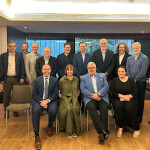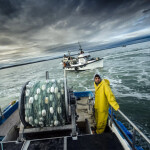Marine spatial planning (MSP) is moving ahead rapidly in Europe, Australia and the United States, creating both a threat and an opportunity for the fishing industry. The threat comes from the fact that many fisheries are not actively engaging in MSP discussions in a coordinated manner. This means there is a substantial risk that the benefits of responsible fisheries may be compromised by the predominance of other stakeholder interests.
MSP is a defined by UNESCO (the United Nations Educational, Scientific and Cultural Organization) as a “public and political process of analyzing and allocating the spatial and temporal distribution of human activities in marine areas to achieve ecological, economic and social objectives.” The reality is that environmental interests are driving MSP in most areas, and few marine industries are at the table as ocean planning moves forward.
According to Paul Holthus, executive director of the World Ocean Council (WOC), if MSP is to support the sustainable use of marine space and resources by responsible industry operators, then the entire marine business community needs to collaborate in the planning process. “To promote and support such engagement, we have launched the first-ever survey of ocean industries engaging in MSP,” he said.
The need to manage conflicts and cumulative use impacts is often cited as a fundamental rationale for MSP. Its proponents argue that it will provide numerous benefits for the business community, including better coordination of regulatory processes, increased certainty for investors, greater public and political buy-in for projects, acknowledgement of the importance of economic ocean use, and a process to address spatial and operational conflicts and develop synergies.
Paul Holthus says that little information is available on whether these benefits actually occur, and business community attitudes, expectations and experiences of MSP remain largely unknown. “To help address this gap, we are conducting the first international survey on MSP and encourage everyone involved in a marine industry to complete it,” he said. “The results will give us a better idea of who is at the table, and help us to coordinate wider industry efforts to engage in the process.” Click here to view the survey. It closes on 30 June.
In the United States, the federal government recently established a National Ocean Council (NOC) that proposes to implement MSP through a series of nine regional programs. The NOC is holding a national workshop in late June for government agencies to develop the government’s MSP Strategic Action Plan.
This presents an immediate opportunity for marine businesses to actively engage in a coordinated approach to ocean planning before it’s too late. The NGO community has enjoyed a national coalition on MSP for several years and is actively involved in the process. The marine business community needs to get equally well organized or lose out on valuable ground.
“The WOC is organizing a business forum on MSP on July 13 to 14 in Washington D.C. to give companies a better understanding of the importance of participating at the MSP table and to develop an action plan that will help them engage in the process as it develops in the U.S.” said Holthus. Forums are also being planned for Australia and Europe.
“This first event aims to bring everyone together to foster, facilitate and, most importantly, plan for concrete business involvement in the U.S. MSP process,” said Holthus. “It is a case of ‘find out or lose out,’ and I cannot overemphasize the need for people to sit up, take notice, and get involved.”






